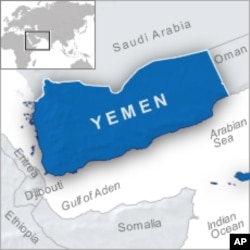The International Organization for Migration is urgently appealing for $1 million to help a group of more than 1,000 Ethiopian migrants stranded in northern Yemen return home.
The International Organization for Migration says the Ethiopian migrants, mostly young men, are stranded without food, water and shelter in the northern Yemeni border town of Haradh.
IOM spokesman Jean-Philippe Chauzy says they represent a fraction of the growing number of migrants in Haradh. He says their desperate plight highlights an emerging humanitarian crisis on Yemen's border with Saudi Arabia.
"Those migrants are stranded because obviously they cannot cross the border into Saudi Arabia and they have no money, no documentation," said Chauzy. " They cannot return back to Ethiopia should they want to do so."
"We are getting calls from those migrants, regular calls for assistance. Overwhelmingly, those migrants want to return home. They realize that they will not be able to go forward. They will not be able to return home without any assistance and that is why we have organized this operation to repatriate on a voluntary basis," he added.
Yemen is a major transit route for migrants and asylum-seekers from the Horn of Africa to the Middle East and beyond. But, the border region is less permeable than it used to be. The conflict between Houthi insurgents and government forces in Yemen's Saada province has prompted Saudi Arabia to close its border with Yemen, thus shutting off the gateway to the Middle East.
As a consequence, Chauzy says, the Ethiopian migrants are stuck at the border with no hope of going to the Middle East in search of work or of returning home.
"Most of the young Ethiopians who left rural areas of Ethiopia left because they were lured by smugglers that they would find jobs in Saudi Arabia," he said. "Most of them had no idea that they would have to face the dangers of the crossing of the Gulf of Aden. None of them realized how difficult it would be for them in Yemen and none of them knew that they would probably end up stranded in the border region without absolutely no assistance whatsoever."
Chauzy says the condition of most of the migrants in and around Haradh is very poor. He says their long and perilous journey has left them dehydrated and malnourished. Many are in very bad health.
He says IOM is running programs to raise awareness among Ethiopians of the risks of irregular migration. He says IOM is working with communities to find local solutions to chronic unemployment in rural areas so young people will not leave in a desperate bid to find jobs abroad.




